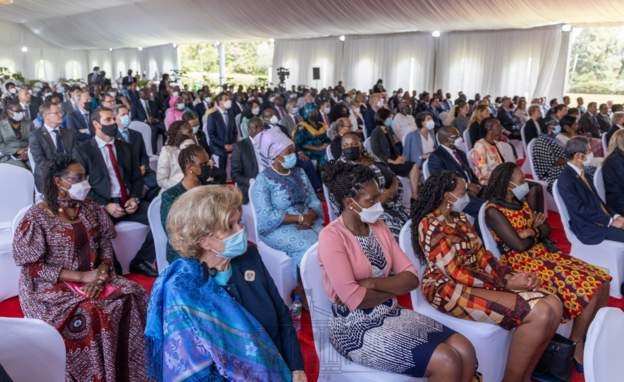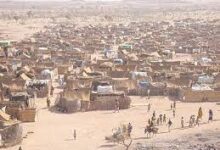
Kenya has written to Somalia to express “regret” at the “inadvertent and inappropriate presence” of the flag of the breakaway state of Somaliland at an event hosted by President Uhuru Kenyatta.
Somalia’s ambassador to Kenya, Mohamud Ahmed Nur, was reported to have walked out of Tuesday’s annual diplomats’ conference in Kenya’s capital, Nairobi.
In its letter, Kenya’s foreign ministry said it reaffirmed “its recognition of the sovereignty of one Federal Somali Government and the integrity of the Federal Somali State”.
Somaliland declared independence from Somalia in 1991 although it has not been recognised internationally. It functioned just as a nation state – with its own passport, currency, flag, government and army.
In a response on Twitter, its ministry of foreign affairs said “it was disappointed about the actions taken by the ambassador of Somalia” at the event.
“The Republic of Somaliland is a sovereign, independent and democratic country that aspires to line in peace and tranquility with our neighbouring countries, that includes Somalia,” the statement said.
People in Somaliland wee hoping that elections will boost the breakaway republic’s chances of gaining international recognition as an independent state. Since declaring independence from Somalia, it had not been recognised internationally but functioned as a nation state – with its own passport, currency, flag, government and army.
Somaliland might be more democratic than some other countries in the region, but its system was far from perfect.
The parliamentary poll was more than 10 years late. Municipal elections, which will be held at the same time, should have taken place four years ago. There were other problems too. Somaliland’s House of Representatives has no members from minority clans and only one woman out of 82 Members of Parliament (MPs), although more were running this time.
Five opposition candidates were arrested in the run-up to the vote. Government attitudes towards the media were hardening, with journalists harassed and arrested, and media houses shut down.
Efforts have been made to prevent political parties from becoming too closely associated with individual clans, with only three allowed to compete in legislative elections.
But the chairman of the Justice and Development party, Faisal Warabe, warned that clannism continued to pose a danger.It was hard to compare the situation in Somaliland with that of Somalia. -BBC






